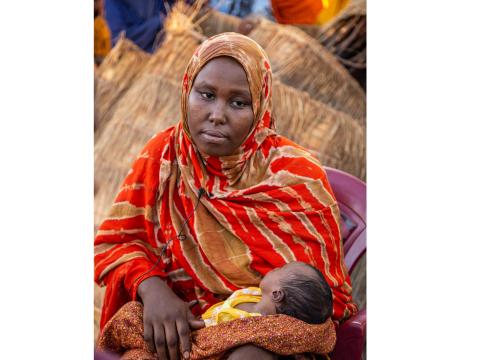This is birth on the run: Iqra’s story

This is Iqra. She was heavily pregnant when Somalia’s looming famine forced her from home.
“What to eat–or whether I would be alive–was my biggest concern.” she recounts. “I didn’t even have water to drink. It was horrible.”
Violence isn’t the only thing forcing people to flee their country. Climate change severely affects millions of people, like refugees, internally displaced people (IDPs), and their communities. Women and children, like Iqra and her baby, are typically the most at risk.
Iqra left Hawaardire during a longstanding drought that killed her livestock, and with that, her chances of survival. “I was hungry and thirsty,” she remembers. “Life was unbearable there.”

This is the story of her brave escape.
“I spent 10 days on the road,” she recalls. On day five of her journey, she went into labour. Despite unstable conditions and no medical support, she faced something that many mothers fear: birthing unassisted.
“I gave birth to my donkey,” Iqra shares. With no milk to drink and only her mother’s arms to call home, Iqra’s baby was born into crisis and chaos.
“I had excessive bleeding and a pounding heart,” the young mother says. “I never thought I would live. I was so worried.
“After I gave birth, the fellow travellers waited two days for me to regain energy and consciousness. Then we continued our journey.”
Iqra is one of nearly 103 million people worldwide who have been forced from home.
Right now, 6.5 million people in Somalia are facing famine-like conditions, spurred by poor rainfall, limited water sources and perishing livestock, forcing displacement. The war in Ukraine has made matters worse, threatening Somalia’s supply of grain and driving up food prices in the market.
When Iqra arrived at the Internally Displaced Person camp, supported by World Vision, she was welcomed and supported. Basics like food, water and shelter were immediately given to her. But being freshly postpartum, exhausted, and under stress, this new mother had a depleted breastmilk supply and didn’t know how she would be able to feed her baby. “I didn’t have anything at all,” she shares.
Every mother can relate to the panic of not knowing if her baby will be fed. When asked what Iqra had been using to keep her baby alive, she replied, “Water and sugar”.
After arriving, Iqra was given the necessities that she and her newborn needed to survive. She was grateful to have access to essentials and medical support. “At least it’s better here,” she says of World Vision’s initiative. “I felt a sigh of relief when we arrived. The community supported me with food and water and welcomed me here. Even my child started breastfeeding after drinking water.”
Mothers are often the ones making hard decisions to protect their families. In Iqra’s case, leaving was her biggest chance of survival. The tradeoff? She sacrificed her comfort and familiarity and gave birth on the run. Iqra says, “My hope is to have a good life.”

This is what a mother does for her child.
Over the last 30 years, hundreds of thousands of people have fled Somalia due to political instability and a dangerous civil war. There are over 836,000 Somali refugees and asylum-seekers worldwide today, but those are just the number of people who’ve managed to escape. Millions more remain stuck in camps inside the country.
While refugees and asylum-seekers have crossed borders to escape chronic instability and violence, IDPs (Internally Displaced People) remain stuck within their country, but often far from home. Those who are internally displaced often feel caught in a cruel limbo: unable to flee, yet unable to start a new life. That’s why World Vision works inside Somalia responding to the needs of anyone whose been forced from home.
There is no simple solution. But that's never stopped us before, and it won’t stop us now. With your support, we can go where the danger is and do whatever it takes to be the village that new mothers need to survive, recover and build a new future.

This is how we rally around survivors like Iqra.
It’s not easy and it’s not quick. But it works. Together, we can build strong communities where Iqra’s children are safe to go to school, play with their friends, and dream about the future.
This World Refugee Day, don't underestimate your role.
Give to Childhood Rescue today.